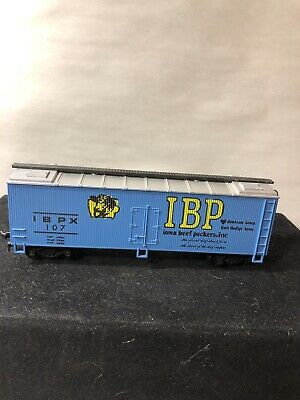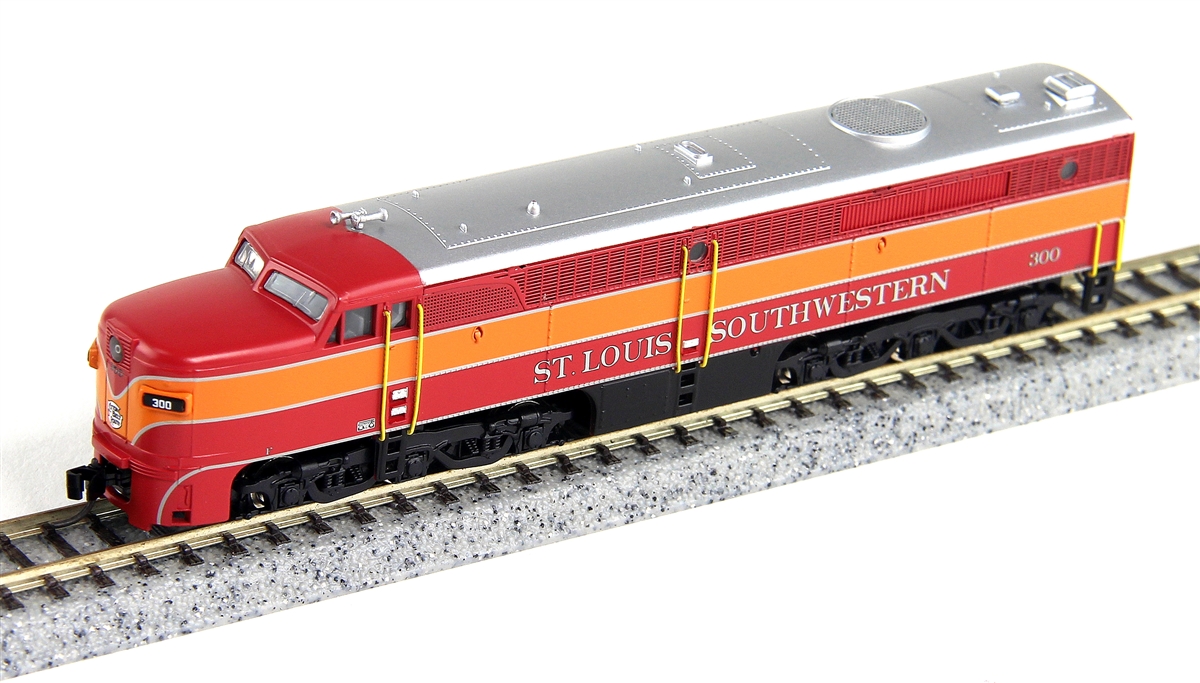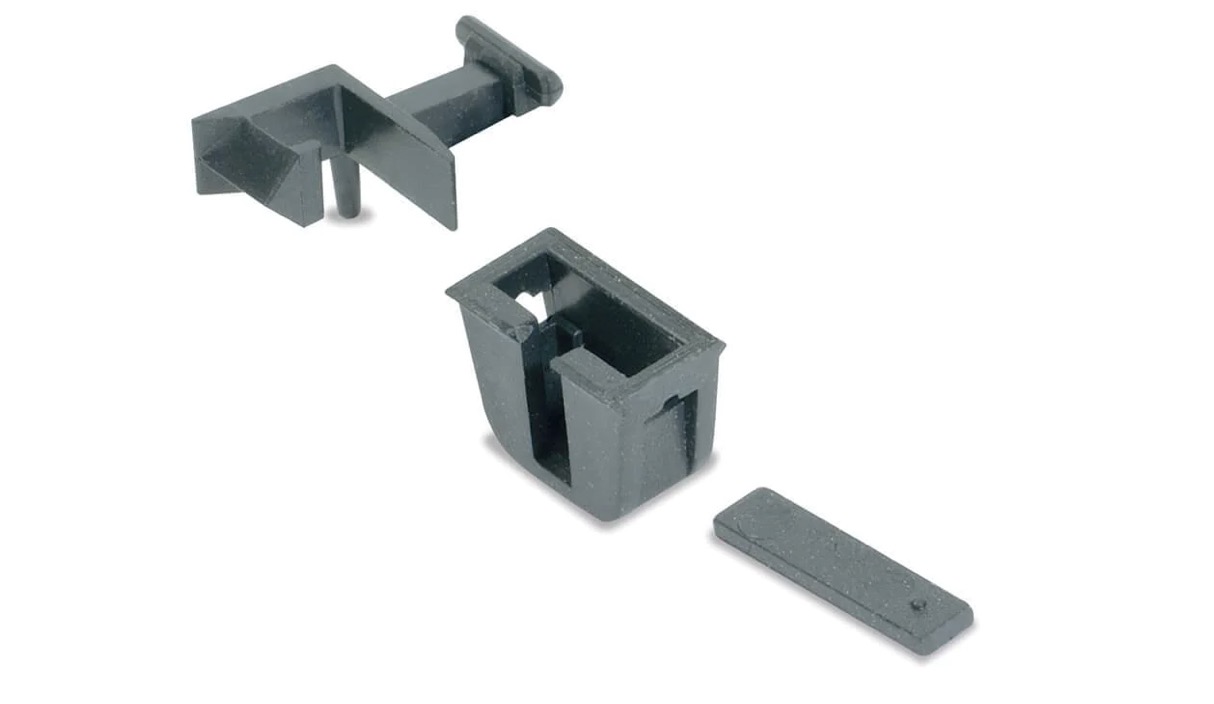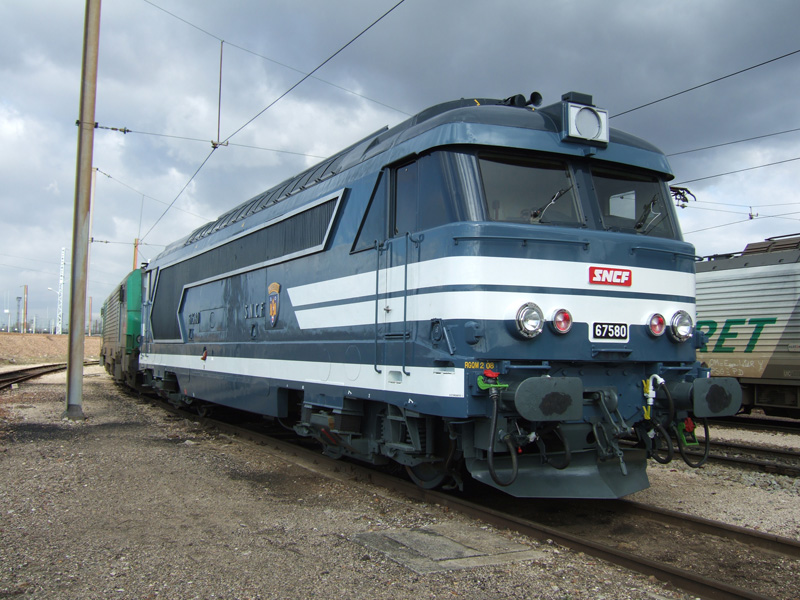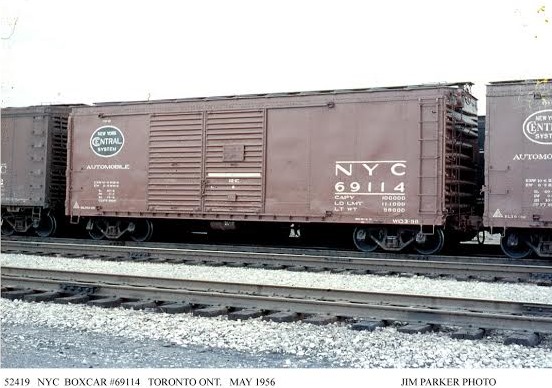Prototype Information: Steel boxcars became a common site in the post-WWII period (also known as the transition era). Steel construction resulted in a lighter, lower-maintenance car that was less expensive to acquire and operate. The economies of scale that happened during the war along with a cessation of orders from the military resulted in a plentiful, inexpensive source of metal and aluminum for the railcar manufacturers which in turn led a complete replacement of the aging wood-sheathed fleets with new steel cars.
One common variation of the ubiquitous 40 foot steel boxcar was the double-sliding door variation. This configuration allowed for easier loading and unloading of larger objects. A common use-case was automobile transportation. In the modern era, we are used to seeing huge autoracks with up to three levels of cars stacked one on top of the other, but back during the transition era, these beasts did not exist, and car were loaded onto boxcars with this special door configuration. Although this type of car was used for other bulky objects, they were frequently labeled 'Automobile' on the sides to clearly indicate to potential customers that the railroad had the capacity to transport this large bulky objects with their fleet.
One common variation of the ubiquitous 40 foot steel boxcar was the double-sliding door variation. This configuration allowed for easier loading and unloading of larger objects. A common use-case was automobile transportation. In the modern era, we are used to seeing huge autoracks with up to three levels of cars stacked one on top of the other, but back during the transition era, these beasts did not exist, and car were loaded onto boxcars with this special door configuration. Although this type of car was used for other bulky objects, they were frequently labeled 'Automobile' on the sides to clearly indicate to potential customers that the railroad had the capacity to transport this large bulky objects with their fleet.
Road/Company Information:  In 1960, Iowa Beef Packers (as it was then known) was founded by Currier Holman and A. D. Anderson with $300,000 in financing from the Small Business Administration, rather than a traditional bank. They built a completely new plant in Dennison, Iowa, close to big feedlots and cheap energy sources. The sprawling plant was all on one floor so that the beef carcasses could be moved around on conveyers. Immediately after the animal was killed, the beef was refrigerated and the rest of the process was done in the cold. That reduced the shrinkage of the meat from dehydration.
In 1960, Iowa Beef Packers (as it was then known) was founded by Currier Holman and A. D. Anderson with $300,000 in financing from the Small Business Administration, rather than a traditional bank. They built a completely new plant in Dennison, Iowa, close to big feedlots and cheap energy sources. The sprawling plant was all on one floor so that the beef carcasses could be moved around on conveyers. Immediately after the animal was killed, the beef was refrigerated and the rest of the process was done in the cold. That reduced the shrinkage of the meat from dehydration.
IBP was acquired by Tyson Foods in 2001 for US$3.2 billion in cash and stock. Tyson continues to use the IBP name as a brand for its commodity beef and pork products.

IBP was acquired by Tyson Foods in 2001 for US$3.2 billion in cash and stock. Tyson continues to use the IBP name as a brand for its commodity beef and pork products.
Brand/Importer Information: Mehano is a Slovenian toy manufacturer located in Izola, Slovenija. The company was founded as Mehanotehnika and was producing toys starting in June 1953. They first exhibited at the Nuerenberg Toy Fair in 1959. Mehano produced a number of different locomotives and rolling stock models for the North American market in the 1960s and 1970s. Companies such as Atlas and Life-Like imported a huge variety of their products. Generally they can easily be recognized as they are stamped "Yugosolavia" on the underframe. The company was formally renamed "Mehano" in 1990. Izola today is part of the country of Slovenia since the breakup of Yugoslavia.
Mehano filed for bankruptcy in 2008, but still continued to exist and operate. Since 2012, Mehano products are distributed by Lemke.
Mehano filed for bankruptcy in 2008, but still continued to exist and operate. Since 2012, Mehano products are distributed by Lemke.
Manufacturer Information: Mehano is a Slovenian toy manufacturer located in Izola, Slovenija. The company was founded as Mehanotehnika and was producing toys starting in June 1953. They first exhibited at the Nuerenberg Toy Fair in 1959. Mehano produced a number of different locomotives and rolling stock models for the North American market in the 1960s and 1970s. Companies such as Atlas and Life-Like imported a huge variety of their products. Generally they can easily be recognized as they are stamped "Yugosolavia" on the underframe. The company was formally renamed "Mehano" in 1990. Izola today is part of the country of Slovenia since the breakup of Yugoslavia.
Mehano filed for bankruptcy in 2008, but still continued to exist and operate. Since 2012, Mehano products are distributed by Lemke.
Mehano filed for bankruptcy in 2008, but still continued to exist and operate. Since 2012, Mehano products are distributed by Lemke.
Item created by: luchestr on 2022-05-23 17:13:50
If you see errors or missing data in this entry, please feel free to log in and edit it. Anyone with a Gmail account can log in instantly.
If you see errors or missing data in this entry, please feel free to log in and edit it. Anyone with a Gmail account can log in instantly.


